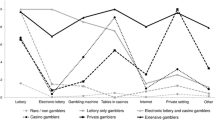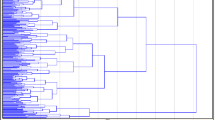Abstract
The objective of this study was to identify profiles of gamblers to explain the choice of preferred gambling activity among both problem and non-problem gamblers. 628 non-problem and problem gamblers were assessed with a structured interview including “healthy” (sociodemographic characteristics, gambling habits and personality profile assessed with the Temperament and Character Inventory-125) and “pathological” [diagnosis of pathological gambling, gambling-related cognitions (GRCs) and psychiatric comorbidity] variables. We performed a two-step cluster analysis based solely on “healthy” variables to identify gamblers’ profiles which typically reflect the choice of preferred gambling activity. The obtained classes were then described using both “healthy” and “pathological” variables, by comparing each class to the rest of the sample. Clusters were generated. Class 1 (Electronic Gaming Machines gamblers) showed high cooperativeness, a lower level of GRC about strategy and more depressive disorders. Class 2 (games with deferred results gamblers) were high novelty seekers and showed a higher level of GRC about strategy and more addictive disorders. Class 3 (roulette gamblers) were more often high rollers and showed a higher level of GRC about strategy and more manic or hypomanic episodes and more obsessive–compulsive disorders. Class 4 (instant lottery gamblers) showed a lower tendency to suicide attempts. Class 5 (scratch cards gamblers) were high harm avoiders and showed a lower overall level of GRC and more panic attacks and eating disorders. The preference for one particular gambling activity may concern different profiles of gamblers. This study highlights the importance of considering the pair gambler-game rather than one or the other separately, and may provide support for future research on gambling and preventive actions directed toward a particular game.

Similar content being viewed by others
References
Álvarez-Moya, E. M., Jiménez-Murcia, S., Aymamí, M. N., Gómez-Peña, M., Granero, R., Santamaría, J., et al. (2010). Subtyping study of a pathological gamblers sample. Canadian Journal of Psychiatry, 55(8), 498–506.
APA. (2000). DSM-IV-TR. Diagnostic and statistical manual of mental disorders (4 th ed, text revision). Washington, DC: American Psychiatric Association.
Bjerg, O. (2010). Problem gambling in poker: Money, rationality and control in a skill-based social game. International Gambling Studies, 10(3), 239–254. doi:10.1080/14459795.2010.520330.
Bouju, G., Grall-Bronnec, M., Landreat-Guillou, M., & Vénisse, J. L. (2011). Jeu pathologique: facteurs impliqués. L’Encéphale, 37(4), 322–331. doi:10.1016/j.encep.2011.01.003.
Bouju, G., Grall-Bronnec, M., Quistrebert-Davanne, V., Hardouin, J. B., & Vénisse, J. L. (2013). Texas hold’em poker: A qualitative analysis of gamblers’ perceptions. Journal of Gambling Issues (28), 1–28. doi:10.4309/jgi.2013.28.4.
Bouju, G., Hardouin, J. B., Boutin, C., Gorwood, P., Le Bourvellec, J. D., Feuillet, F., et al. (2014). A shorter and multidimensional version of the gambling attitudes and beliefs survey (GABS-23). Journal of Gambling Studies, 30(2), 349–367. doi:10.1007/s10899-012-9356-3.
Boutin, C. (2010). Le jeu: chance ou stratégie ?. Montréal: Choisir librement la place du jeu dans votre vie.
Breen, R. B., & Zimmerman, M. (2002). Rapid onset of pathological gambling in machine gamblers. Journal of Gambling Studies, 18(1), 31–43.
Breen, R. B., & Zuckerman, M. (1999). ‘Chasing’ in gambling behavior: Personality and cognitive determinants. Personality and Individual Differences, 27(6), 1097–1111. doi:10.1016/S0191-8869(99)00052-5.
Chakroun-Vinciguerra, N., Faytout, M., Pélissolo, A., & Swendsen, J. (2005). Validation française de la version courte de l’Inventaire du Tempérament et du Caractère (TCI-125). Journal de Thérapie Comportementale et Cognitive, 15(1), 27–33. doi:10.1016/S1155-1704(05)81209-1.
Challet-Bouju, G., Hardouin, J. B., Vénisse, J. L., Romo, L., Valleur, M., Magalon, D., et al. (2014). Study protocol: The JEU cohort study—Transversal multiaxial evaluation and 5-year follow-up of a cohort of French gamblers. BMC Psychiatry, 14(1), 226. doi:10.1186/s12888-014-0226-7.
Cloninger, C. R., Svrakic, D. M., & Przybeck, T. R. (1993). A psychobiological model of temperament and character. Archives of General Psychiatry, 50(12), 975–990. doi:10.1001/archpsyc.1993.01820240059008.
Dorfman, A., Bereby-Meyer, Y., & Moran, S. (2013). When feeling skillful impairs coordination in a lottery selection task. PLoS ONE, 8(6), e65092. doi:10.1371/journal.pone.0065092.
Dowling, N., Smith, D., & Thomas, T. (2005). Electronic gaming machines: Are they the ‘crack-cocaine’ of gambling? [Review]. Addiction, 100(1), 33–45. doi:10.1111/j.1360-0443.2004.00962.x.
Dreef, M., Borm, P., & Van der Genugten, B. (2004). Measuring skill in games: Several approaches discussed. Mathematical Methods of Operations Research (59), 375–391. doi:10.1007/s001860400347.
Echeburúa, E., González-Ortega, I., De Corral, P., & Polo-López, R. (2011). Clinical gender differences among adult pathological gamblers seeking treatment. Journal of Gambling Studies (27), 215–227. doi:10.1007/s10899-010-9205-1.
Everitt, B. S., Landau, S., Leese, M., & Stahl, D. (2011). Cluster analysis (5th ed.). Oxford: Wiley Series in Probability and Statistics.
Grall-Bronnec, M., Bouju, G., Landréat-Guillou, M., & Vénisse, J. L. (2010). Evaluation sociodémographique, clinique et du parcours de jeu d’un échantillon de joueurs pathologiques français. L’Encéphale, 36(6), 452–460. doi:10.1016/j.encep.2010.02.002.
Grant, J. E., & Kim, S. W. (2002). Gender differences in pathological gamblers seeking medication treatment. [Comparative Study]. Comprehensive Psychiatry, 43(1), 56–62. doi:10.1053/comp.2002.29857.
Grant, J. E., Odlaug, B. L., Chamberlain, S. R., & Schreiber, L. R. (2012). Neurocognitive dysfunction in strategic and non-strategic gamblers. Progress in Neuropsychopharmacology and Biological Psychiatry, 38(2), 336–340. doi:10.1016/j.pnpbp.2012.05.006.
Griffiths, M. D. (1994). The role of cognitive bias and skill in fruit machine gambling. British Journal of Psychology, 85(3), 351–369.
Husson, F., Lê, S., & Pagès, J. (2010). Exploratory multivariate analysis by example using R (CRC computer science & data analysis). London: CRC Press.
Inserm. (2008). Jeux de hasard et d’argent: Contextes et addictions (pp. 1–497). Paris: Inserm - Institut national de la santé et de la recherche médicale.
Jiménez-Murcia, S., Álvarez-Moya, E. M., Stinchfield, R., Fernández-Aranda, F., Granero, R., Aymamí, N., et al. (2010). Age of onset in pathological gambling: Clinical, therapeutic and personality correlates. Journal of Gambling Studies, 26(2), 235–248. doi:10.1007/s10899-009-9175-3.
Kelly, J. M., Dhar, Z., & Verbiest, T. (2007). Poker and the law: Is it a game of skill or chance and legally does it matter? Gaming law review, 11(3), 190–202. doi:10.1089/glr.2007.11309.
Ladouceur, R., Gaboury, A., Dumont, M., & Rochette, P. (1988). Gambling: Relationship between the frequency of wins and irrational thinking. The Journal of Psychology, 122(4), 409–414. doi:10.1080/00223980.1988.9915527.
Langer, E. J., & Roth, J. (1975). Heads I win, tails it’s chance: The illusion of control as a function of the sequence of outcomes in a purely chance task. Journal of Personality and Social Psychology, 32(6), 951–955.
LaPlante, D. A., Kleschinsky, J. H., LaBrie, R. A., Nelson, S. E., & Shaffer, H. J. (2009). Sitting at the virtual poker table: A prospective epidemiological study of actual Internet poker gambling behavior. Computers in Human Behavior, 25(3), 711–717. doi:10.1016/j.chb.2008.12.027.
Laplante, D. A., Nelson, S. E., & Gray, H. M. (2013). Breadth and depth involvement: Understanding internet gambling involvement and its relationship to gambling problems. Psychology of Addictive Behaviors,. doi:10.1037/a0033810.
Lecrubier, Y., Sheehan, D. V., Weiller, E., Amorim, P., Bonora, I., Harnett Sheehan, K., et al. (1997). The Mini International Neuropsychiatric Interview (MINI). A short diagnostic structured interview: Reliability and validity according to the CIDI. European Psychiatry, 12(5), 224–231. doi:10.1016/S0924-9338(97)83296-8.
Loba, P., Stewart, S. H., Klein, R. M., & Blackburn, J. R. (2001). Manipulations of the features of standard video lottery terminal (VLT) games: Effects in pathological and non-pathological gamblers. Journal of Gambling Studies, 17(4), 297–320.
Meyer, G., von Meduna, M., Brosowski, T., & Hayer, T. (2013). Is poker a game of skill or chance? A quasi-experimental study. Journal of Gambling Studies, 29(3), 535–550. doi:10.1007/s10899-012-9327-8.
Miller, J. D., Mackillop, J., Fortune, E. E., Maples, J., Lance, C. E., Keith Campbell, W., et al. (2013). Personality correlates of pathological gambling derived from Big Three and Big Five personality models. Psychiatry Research, 206(1), 50–55.
Odlaug, B. L., Schreiber, L. R., & Grant, J. E. (2013). Personality dimensions and disorders in pathological gambling. Current Opinion in Psychiatry, 26(1), 107–112. doi:10.1097/YCO.0b013e32835997df.
Petry, N. M. (2003). A comparison of treatment-seeking pathological gamblers based on preferred gambling activity. Addiction, 98(5), 645–655.
Petry, N. M., & Mallya, S. (2004). Gambling participation and problems among employees at a University Health Center. Journal of Gambling Studies, 20(2), 155–170. doi:10.1023/B:JOGS.0000022307.09299.f5.
Phillips, J. G., Ogeil, R., Chow, Y. W., & Blaszczynski, A. (2013). Gambling involvement and increased risk of gambling problems. Journal of Gambling Studies, 29(4), 601–611. doi:10.1007/s10899-012-9325-x.
Raylu, N., & Oei, T. P. (2002). Pathological gambling. A comprehensive review. Clinical Psychology Review, 22(7), 1009–1061. doi:10.1016/S0272-7358(02)00101-0.
Sharpe, L. (2002). A reformulated cognitive–behavioral model of problem gambling: A biopsychosocial perspective. Clinical Psychology Review, 22(1), 1–25. doi:10.1016/S0272-7358(00)00087-8.
Shead, N. W., Hodgins, D. C., & Scharf, D. (2008). Differences between poker players and non-poker-playing gamblers. International Gambling Studies, 8(2), 167–178. doi:10.1080/14459790802139991.
Stevens, M., & Young, M. (2010). Who plays what? Participation profiles in chance versus skill-based gambling. Journal of Gambling Studies, 26(1), 89–103. doi:10.1007/s10899-009-9143-y.
Toneatto, T., & Ladouceur, R. (2003). Treatment of pathological gambling: A critical review of the literature. Psychology of Addictive Behaviors: Journal of the Society of Psychologists in Addictive Behaviors, 17(4), 284–292. doi:10.1037/0893-164X.17.4.284.
Toneatto, T., & Millar, G. (2004). Assessing and treating problem gambling: Empirical status and promising trends. Canadian Journal of Psychiatry, 49(8), 517–525.
Turner, N. E., & Fritz, B. (2001). The effect of skilled gamblers on the success of less skilled gamblers. The Journal of Gambling Issues. doi:10.4309/jgi.2001.5.10.
Walker, M. B. (1992). Irrational thinking among slot machine players. Journal of Gambling Studies, 8(3), 245–261. doi:10.1007/BF01014652.
Welte, J. W., Barnes, G. M., Wieczorek, W. F., Tidwell, M. C. O., & Hoffman, J. H. (2007). Type of gambling and availability as risk factors for problem gambling: A Tobit regression analysis by age and gender. International Gambling Studies, 7(2), 183–198. doi:10.1080/14459790701387543.
Welte, J. W., Barnes, G. M., Wieczorek, W. F., Tidwell, M. C., & Parker, J. (2002). Gambling participation in the U.S.—Results from a national survey. Journal of Gambling Studies, 18(4), 313–337.
Welte, J. W., Barnes, G. M., Wieczorek, W. F., Tidwell, M. C. O., & Parker, J. C. (2004). Risk factors for pathological gambling. Addictive Behaviors, 29(2), 323–335. doi:10.1016/j.addbeh.2003.08.007.
Acknowledgments
We wish to sincerely thank all the staff who contributed to this study (JEU group), for their valuable assistance and significant investment. A special thanks to those who collected the data. We also want to thank Olé Bjerg and Claude Boutin for their kind permission to reproduce their game classifications. Members of the JEU Group are: Marie Grall-Bronnec, Gaëlle Challet-Bouju, Jean-Luc Vénisse, Lucia Romo, Cindy Legauffre, Caroline Dubertret, Irène Codina, Marc Valleur, Marc Auriacombe, Mélina Fatséas, Jean-Marc Alexandre, Pierre-Michel Llorca, Isabelle Chéreau-Boudet, Christophe Lançon, David Magalon, Michel Reynaud and Mohamed-Ali Gorsane. This study was supported by both the joint support of the French Inter-departmental Mission for the fight against drugs and drug addiction (MILDT) and the French National Institute of Health and Medical Research (INSERM), as part of the call for research projects launched by these two organizations in 2007, and a grant from the French Ministry of Health (PHRC 2009—RCB 2008-A01188-47). There were no constraints on publishing. This research was conducted at the initiative of and coordinated by the Clinical Investigation Unit BALANCED “BehaviorAL AddictioNs and ComplEx mood Disorders” of the University Hospital of Nantes, who is the sponsor of this study.
Conflict of interest
M.G.B., J.L.V. and G.C.B. declare that the University Hospital of Nantes has received funding from gambling industry (Française Des Jeux and Pari Mutuel Urbain) in the form of a sponsorship which supports the gambling section of the BALANCED Unit (the Reference Centre for Excessive Gambling). Scientific independence towards gambling industry operators is warranted. C.L. declares that the University of Paris Ouest Nanterre La Défense has received funding directly from gambling industry (Française Des Jeux and Pari Mutuel Urbain) as part of other research contracts—this funding has never had any influence on the present work. J.B.H., N.R., M.V., D.M., M.F., .I.C.B. and M.A.G. declare that they have no conflicts of interest. There were no constraints on publishing.
Author information
Authors and Affiliations
Consortia
Corresponding author
Rights and permissions
About this article
Cite this article
Challet-Bouju, G., Hardouin, JB., Renard, N. et al. A Gamblers Clustering Based on Their Favorite Gambling Activity. J Gambl Stud 31, 1767–1788 (2015). https://doi.org/10.1007/s10899-014-9496-8
Published:
Issue Date:
DOI: https://doi.org/10.1007/s10899-014-9496-8




